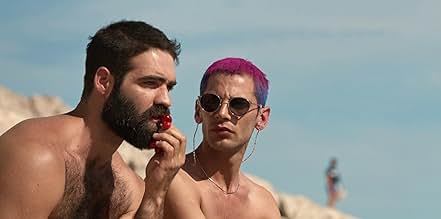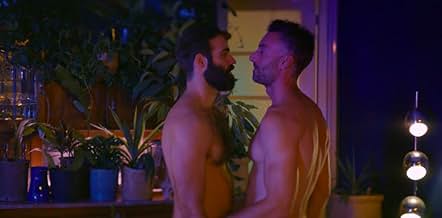AVALIAÇÃO DA IMDb
6,7/10
1,5 mil
SUA AVALIAÇÃO
Adicionar um enredo no seu idiomaWhile having a day-long swim at Athens' queer beach, best friends Demos and Nikitas recall the events of a recent summer in the prospect of turning them into a screenplay for Nikitas' featur... Ler tudoWhile having a day-long swim at Athens' queer beach, best friends Demos and Nikitas recall the events of a recent summer in the prospect of turning them into a screenplay for Nikitas' feature debut.While having a day-long swim at Athens' queer beach, best friends Demos and Nikitas recall the events of a recent summer in the prospect of turning them into a screenplay for Nikitas' feature debut.
- Direção
- Roteiristas
- Artistas
- Prêmios
- 4 vitórias e 16 indicações no total
- Direção
- Roteiristas
- Elenco e equipe completos
- Produção, bilheteria e muito mais no IMDbPro
Avaliações em destaque
When Robert Rosson and Robert Parrish had way too much footage to work with editing the (eventual) Oscar-winning ALL THE KING'S MEN, they hit upon the idea of finding the central moment of each scene, then cutting out everything that wasn't 100 feet before or after that moment.
The creative team for this movie should have done something similar. There's way too much establishing and throat-clearing at the beginning of every scene, and way too much resolution and tying up loose ends at the finish of every scene.
When you add to this that the characters aren't developed so there's no one to care for, the movie becomes a big bore. I was disappointed. The only thing that kept me watching was the possibility of more on-screen nudity.
The creative team for this movie should have done something similar. There's way too much establishing and throat-clearing at the beginning of every scene, and way too much resolution and tying up loose ends at the finish of every scene.
When you add to this that the characters aren't developed so there's no one to care for, the movie becomes a big bore. I was disappointed. The only thing that kept me watching was the possibility of more on-screen nudity.
The storyline isn't terrible, but it's evident that the film's primary target audience is the Greek community. The lead actor's frequent nudity seems calculated to draw in viewers and generate buzz, but in my opinion, it detracts from the overall authenticity of the film. Tsiantoulas's performance is inconsistent, indicating a lack of effective direction from the filmmaker, which might have better served to guide him to a more convincing portrayal. Additionally, the film straddles the line between comedy and drama without fully committing to either genre. In summary, while it's worth a watch, particularly for a Greek audience, it's best to approach it with tempered expectations.
This Greek film subverts the love story by having gay partners working on the script of a film, extracts of which are cleverly interspersed with the action and sometimes amusingly contradicts it. I'd go so far as to say this is a real original. Even if I'm wrong, I believe I'm right in saying the film will lead to a major offer to director Zacharias Mavroeidis. He's made a few films before but nothing that's had potentially international appeal. This will be a particular joy for film fans, referencing Hollywood and British cinema. Pretentious or not, I knew from the first perfectly framed shot, on the rocks of the Athens coast, that Mavroeidis has talent. This was indeed the case. He draws excellent performances from his entire cast, notably charismatic star Yorgos Tsiantoulas. The film is also beautifully filmed around Athens and some of the footage on the coast is stunning. It includes a sequence in which the partners imagine turning their film into a musical, which is a delight. Zacharias and Yorgos were both at the British premiere at Flare last night, 15 March 2024, and told us great stuff about the Greek film industry (no agents, no intimacy co-ordinators), Carmen the dog, and Zacharias's hope that the film will be condemned by the Greek church. Yes, there's a lot of male nudity and that may be the main reason the screening was sold out. But the film is much more than exploitation: another critic has said that "existential philosophy has never been more playful than it is here" and he's dead right.
Our hero is Demosthenes (played by hunky Yorgos Tsiantoulas), who recently broke up with his partner Panos (Nikolaos Mihas) after a four-year relationship. His best friend is Nikitas (Andreas Labropoulos), a former actor who is now a director.
Sitting on a nude beach where gay cruising is the order of the day, Nikitas and Demosthenes try to come up with ideas for a script Nikitas has to present as his next film project. Demosthenes reflects on his own life as inspiration for the film.
As Demosthenes tells his story, the film jumps backwards and forward depicting the events. We learn quite a bit about each character in the process. Although Demosthenes broke up with Panos, we still notice hints of regret despite him trying to convince Nikitas otherwise. We also meet Demosthenes' mom, who looks after his sick father. And then there's the dog, Carmen, who changes everyone's lives.
Filled with gorgeous physiques and full frontal male nudity, there's plenty of eye candy to keep you drooling, depending on your inclinations, off course. Apart from that, I found the film very realistic. The drama and humour were well balanced and never over the top or sentimental. It was current and relatable. I also thought the actors were perfectly cast in their respective roles.
Sitting on a nude beach where gay cruising is the order of the day, Nikitas and Demosthenes try to come up with ideas for a script Nikitas has to present as his next film project. Demosthenes reflects on his own life as inspiration for the film.
As Demosthenes tells his story, the film jumps backwards and forward depicting the events. We learn quite a bit about each character in the process. Although Demosthenes broke up with Panos, we still notice hints of regret despite him trying to convince Nikitas otherwise. We also meet Demosthenes' mom, who looks after his sick father. And then there's the dog, Carmen, who changes everyone's lives.
Filled with gorgeous physiques and full frontal male nudity, there's plenty of eye candy to keep you drooling, depending on your inclinations, off course. Apart from that, I found the film very realistic. The drama and humour were well balanced and never over the top or sentimental. It was current and relatable. I also thought the actors were perfectly cast in their respective roles.
I think one of the important things about this movie is how brave is. You must have balls to direct such scenes and also the actor to be comfortable to make them. Of course this is European movie. Wondering when the UK and America can do such movie without getting in trouble with the society.
Very well done. I wish more people see in cinema now in the UK. There were a few in there. I guess it's still a problem because of the subtitles.
Also i really liked the dialogues. Many people from the LGBTQ+ community can relate to that. Beautifully filmed and great locations chosen.
If you go back in time you will find great Greek movies.
Very well done. I wish more people see in cinema now in the UK. There were a few in there. I guess it's still a problem because of the subtitles.
Also i really liked the dialogues. Many people from the LGBTQ+ community can relate to that. Beautifully filmed and great locations chosen.
If you go back in time you will find great Greek movies.
Você sabia?
- CuriosidadesThe golden rules of screenwriting listed in the film are: 1/ every movie has 3 acts 2/ every movie has a hero 3/ every hero has a goal 4/ every hero changes in pursuit of their goal
- Erros de gravaçãoAt the final scene you can see the boom mic at the bottom edge of the frame meanwhile Nikitas and Demosthenes have their last talk.
- ConexõesFeatures Washingtonia (2014)
Principais escolhas
Faça login para avaliar e ver a lista de recomendações personalizadas
- How long is The Summer with Carmen?Fornecido pela Alexa
Detalhes
- Data de lançamento
- País de origem
- Idioma
- Também conhecido como
- The Summer with Carmen
- Locações de filme
- Empresas de produção
- Consulte mais créditos da empresa na IMDbPro
Bilheteria
- Faturamento bruto mundial
- US$ 21.235
- Tempo de duração
- 1 h 46 min(106 min)
- Cor
- Proporção
- 1.85 : 1
Contribua para esta página
Sugerir uma alteração ou adicionar conteúdo ausente


































